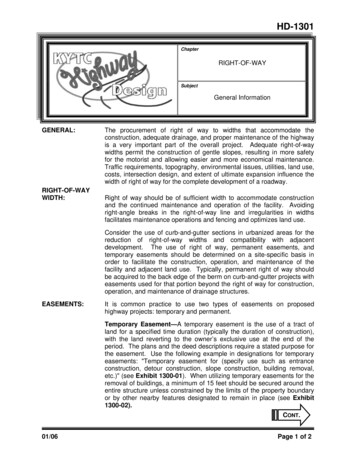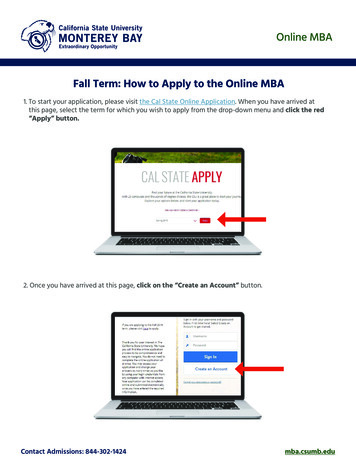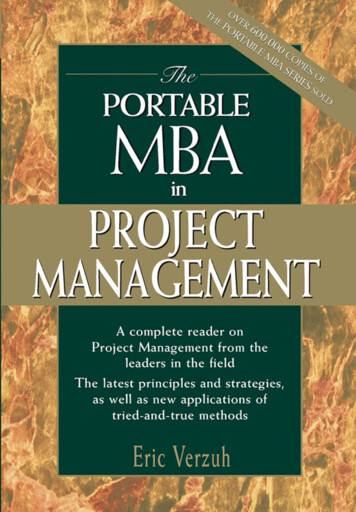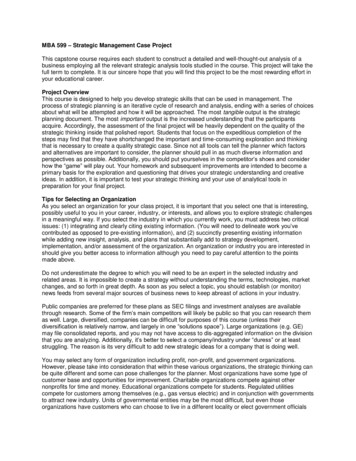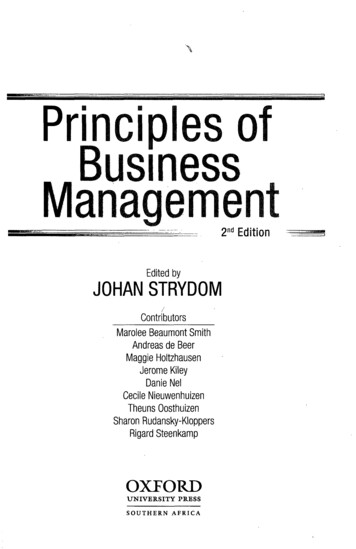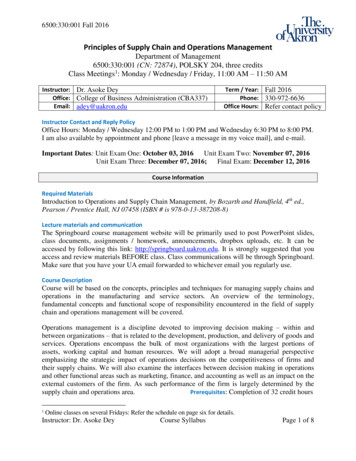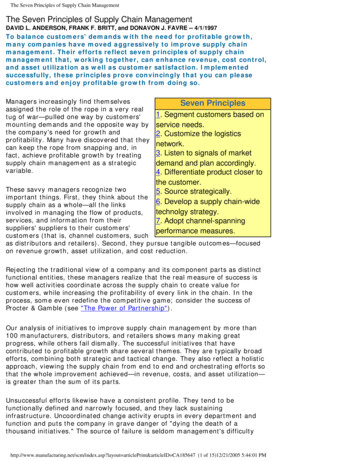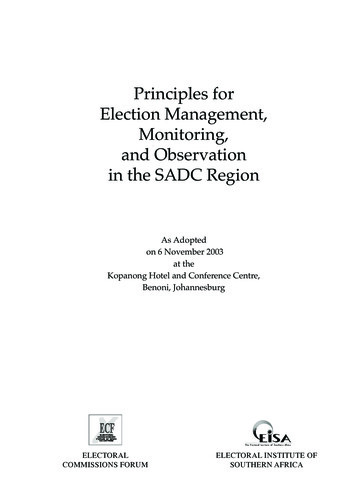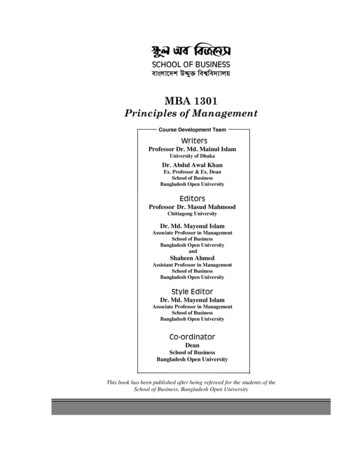
Transcription
SCHOOL OF BUSINESSevsjv‡ k D›gy³ wek we vjqMBA 1301Principles of ManagementCourse Development TeamWritersProfessor Dr. Md. Mainul IslamUniversity of DhakaDr. Abdul Awal KhanEx. Professor & Ex. DeanSchool of BusinessBangladesh Open UniversityEditorsProfessor Dr. Masud MahmoodChittagong UniversityDr. Md. Mayenul IslamAssociate Professor in ManagementSchool of BusinessBangladesh Open UniversityandShaheen AhmedAssistant Professor in ManagementSchool of BusinessBangladesh Open UniversityStyle EditorDr. Md. Mayenul IslamAssociate Professor in ManagementSchool of BusinessBangladesh Open UniversityCo-ordinatorDeanSchool of BusinessBangladesh Open UniversityThis book has been published after being refereed for the students of theSchool of Business, Bangladesh Open University
MBA 1301Principles of ManagementSCHOOL OF BUSINESSBangladesh Open Universityevsjv‡ k D›gy³ wek we vjq
MBA 1301Principles of ManagementPublished by: Publication, Printing & Distribution Division (PPD), Bangladesh OpenUniversity, Gazipur-1705. School of Business, Bangladesh Open University, Date ofSecond Publication: July, 2004. Reprint: July, 2007, November 2009. ComputerCompose & Desktop Processing: Md. Abdul Matin & Mohammad WahiduzzamanHowlader, Cover Design: Monirul Islam, Printed in: Mania Art Press, 53/1 NorthbrookeHall Road, Dhaka-1100.All rights reserved by the School of Business, Bangladesh Open University. No part of this bookcan be reproduced in any form without proper permission from the publisher
Principles of Management (MBA 1301)1. Management - Science, Theory and Practice: Definition of management, itsnature and purpose: Managing: Science or art ( The elements of science),Managerial skills and the organizational hierarchy. Functions of managers.2. The Evolution of Management Thought: Frederick Taylor and scientificmanagement, Followers of Taylor, Fayol. The emergence of behavioral science.The recent contributions to management thought: Changing environment ofmanagement, Social and ethical responsibilities of the managers.3. Planning: Nature, Types and steps of planning, Importance of planning; Natureof objectives, Management by Objectives (MBO); Nature and purpose ofstrategies and policies. The strategic planning process, Major kinds of strategiesand policies, Effective implementation strategies.4.Decision Making: The importance and limitations of rational decision making,Decision making under certainty, Risks and uncertainty; The systems approachand decision making.5. The Nature and Purpose of Organizing - Basic Departmentation: Formal andinformal organization, Organizational division-the department, The structure andprocess of organizing, The span of management; Departmentation by time,Enterprise function, Geography, Product, Customer, Matrix organization.6. Line/Staff Authority and Decentralization: Line and staff concepts, Benefitsand limitations of staff: decentralization of authority, Degrees ofdecentralization, Delegation of authority, Factors determining the degrees ofdecentralization of authority, Making staff work effective, promoting anappropriate organisation culture, Contingencies in organizing.7. The Nature and Purpose of Staffing: Definition of staffing, Purpose ofstaffing, An overview of the staffing functions: Situational factors affectingstaffing, Skills and personal characteristics needed by managers, Recruitment,Selection, Promotion, Demotion and transfer.8. Human factors and Motivation: Human factors in managing, Motivation andmotivators; Special motivational techniques.9. Leadership: Defining Leadership, Ingredients of leadership, Styles andfunctions of leadership, Trait approach to leadership, Situational or contingencyapproaches to leadership.10. Committees and Decision making: The nature of committees, Reasons forusing committees, Disadvantages of committees; The plural executive and theboard of directors, Misuse of committees, Successful operation of committees.11. Communication: Definition of communication, The communication process,Barriers and breakdowns in communication; Towards effective communication,Electronic media in communication.12. The System and Process of Controlling: The basic control process, Initialcontrol points and standards, Control as a Feedback system, Requirement foreffective control; Control techniques - The budget, Traditional non-budgetarycontrol devices.13. Comparative Management: Special features of management Japan, China andGermany.
PrefacePrinciples of Management is primarily intended for the MBA students ofBangladesh Open University. It is written in modular form and is the first of itskind on management in Bangladesh. The lessons have been so designed thatlearners find them easy to understand.The book has thirteen units comprising 42 lessons. We do not claim it to be anoriginal contribution. Rather it should be regarded as a text book of ideas fromvarious renowned authorities in management. We have also quoted fromdifferent text books on management usually followed by post-graduate studentsin our universities. Our endeavour has been to present the lessons in a very lucidmanner so that they can be understood and assimilated by an average distancelearner of the MBA programme within the stipulated period of a semester.Each unit is almost equivalent to one chapter of a conventional text book anddivided into three to five lessons. Each of them starts with "unit highlights" andends with one "exercise" and a case study. In fact the lessons are like the lecturenotes of a classroom teacher, each with "lesson objectives" to begin with and a"lesson-end assessment", at the end in the form of both essay type and multiplechoice questions. We hope that self learners will not find much difficulty inunderstanding the lessons by themselves and will need only a little help from thetutor.Because of a severe time constraint, we have had to make do with unit-end casesfrom conventional text books of western origin. We hope to develop casesextensively in the context of Bangladesh soon so that our MBA students canrelate their learning to their immediate environment and reality.We are grateful to the honorable Vice Chancellor of BOU, who gave us the mostneeded support for publication of this book. Dr. Masud Mahmood, Professor,Department of English, Chittagong University, has made us indebted by hisuntiring efforts in editing each and every lesson diligently and meticulously. Wealso acknowledge with thanks the services of Dr. Md. Mayenul Islam, AssociateProfessor in Management, School of Business, BOU for editing & style editing.We also thankful to Shaheen Ahmed, Assistant Professor in Management, Schoolof Business, Bangladesh Open University for his best effort and impeccableediting. Our thanks are also due to Mr. A. Matin and Mohammad WahiduzzamanHowlader, WPO of the School of Business, for doing their very best to completethe task of word processing on schedule.We shall feel rewarded for our labour if both general readers and self-learnersfind this book worthwhile and useful.Md. Mainul IslamAbdul Awal Khan
ContentsPage No.12Unit-1: Introduction to Management . 1Lesson-1: Definition, Nature and Scope of Management . 3Lesson-2: Purpose and Importance of Management - Features/Characteristics of Management - Distinction betweenManagement, Organisation and Administration . 7Lesson-3: Managing: Science or Art? The Elements of Science in Managing. 11Lesson-4: Managerial Skills and the Organisational Hierarchy . 14Lesson-5: Management Process. 19Unit-2: Historical Evolution of Management Thought . 27Lesson-1: Theories of Management And History Thereof, Classical Schoolof Management Thought . 29Lesson-2: Neo-Classical School of Management Thought . 35Lesson-3: Modern School of Management Thought . 383Unit-3: Planning . 45Lesson-1: Planning: Meaning, Nature, Importance, Types and Steps . 47Lesson-2: The Strategic Planning Process . 574Unit-4: Objectives . 67Lesson-1: Objectives: Definition and Nature of Objectives . 69Lesson-2: Management by Objective (MBO) . 71567Unit-5: Decision Making . 77Lesson-1: Decision Making: Nature and Significance of DecisionMaking, Rationality in Decision Making, Types ofDecisions, Decision Making Conditions . 79Lesson-2: Decision Making: The Process and Managerial Practice,The Systems Approach and Decision Making . 85Unit-6: Organising . 93Lesson-1: Nature, Purpose, Structure, Process and Logicof Organising, Organisational Level and the Span ofManagement . 95Lesson-2: Departmentation . 104Lesson-3: Line, Staff and Functional Authority . 115Lesson-4: Delegation of Authority, Centralization andDecentralization . 120Unit-7: Staffing . 133Lesson-1: Nature of Staffing Function, Human Resource Planning,Systems Approach to Staffing . 135Lesson-2: Recruitment and Selection, Promote or Hire, ManagerSelection . 140Lesson-3: Training, Training Programs and ManagementDevelopment Programs . 145Lesson-4: Performance Appraisal (PA): Meaning and Importance, Types,Appropriate Method of Appraising Manager . 149Lesson-5: Job Change: Promotion, Transfer, Demotion . 154
ContentsPage No.8910111213Unit-8 Human Factors and Motivation . 159Lesson-1: Human Factors in Management, Motivation, MotivationProcess, Motivators, Motivating and Satisfaction .161Lesson-2: Basic Assumptions about Motivation and the Natureof People, McGregor's Theory-X and Theory-Y . 165Lesson-3: Various Leading Theories of Motivation - Their Origin,Strengths and Weaknesses . 168Lesson-4: Special Motivational Techniques . 180Unit-9: Leadership . 185Lesson-1: Definition and Nature of Leadership, Qualities/Ingredients of Leadership .187Lesson-2: Styles/Types of Leadership . 191Lesson-3: Theories of Leadership . 197Unit-10: Committees and Group Decision Making . 205Lesson-1: Definition, Nature and Reasons for Using Committees .207Lesson-2: Plural Executive and Board of Directors, MakingCommittee Successful, Disadvantages and Misuses ofCommittees . 210Unit-11: Communication in Organisations . 217Lesson-1: Definition, Process and Purpose of Communication .219Lesson-2: Communication in Organisation, Importance of EffectiveCommunication .223Lesson-3: Causes of Communication Problems, Ensuring EffectiveCommunication, Electronic Media in Communication .227Unit-12: Controlling . 235Lesson-1: Controlling Defined, Steps in the Control Process,Importance of Control in Management .237Lesson-2: Designing Control System, Control as a FeedbackSystem, Feedforward Control, Techniques of FutureDirected Control . 241Lesson-3: Making Control Effective, Control Techniques- Budgetaryand Non-Budgetary Control Devices . 245Unit-13: Comparative Management and Management in SomeSelected Countries . 257Lesson-1: Comparative Management .259Lesson-2: Management in Japan .266Lesson-3: Management System of Germany . 276Lesson-4: Management in Bangladesh . 283
Introduction to Management1Unit Highlights Definition, Nature and Scope of Management Purpose and Importance of Management, Features of Management,Distinction between Management, Organization and Administration Managing: Science or Art? The Elements of Science in Managing Managerial Skills and the Organizational Hierarchy Management Process
School of BusinessHC fªù¡ M¡ m b¡L hUnit-1Page-2
Bangladesh Open UniversityUnit-1 : Introduction to ManagementLesson 1: Definition, Nature and Scope of ManagementLesson ObjectivesUpon completion of t
Management Process . School of Business HC fªù¡ M¡ m b¡L h Unit-1 Page-2 . Bangladesh Open University Unit-1 : Introduction to Management Lesson 1: Definition, Nature and Scope of Management Lesson Objectives Upon completion of this lesson you will be able to: define management identify who is a manager state the nature of management elaborate the scope of management .

